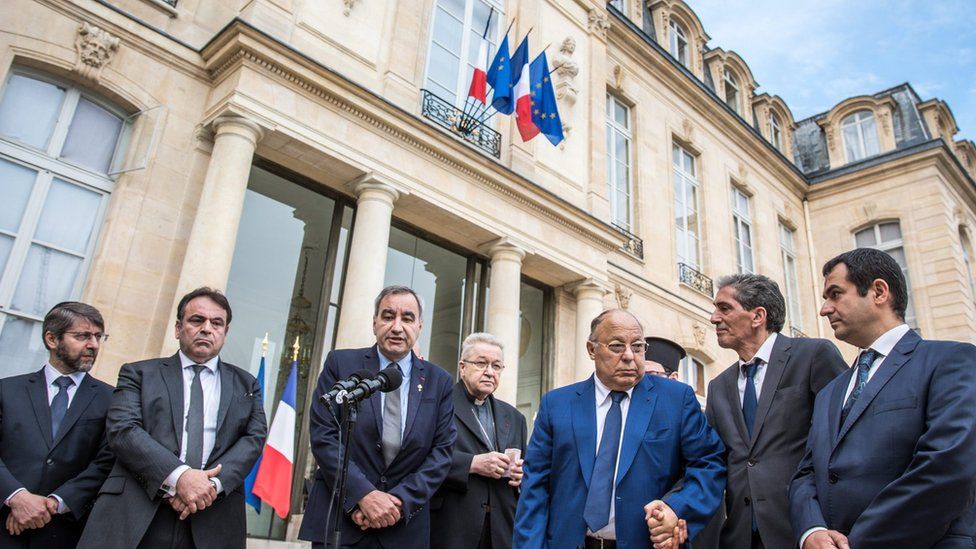French church attack: Faith leaders call for more security
- Published

French religious leaders have called for more security at places of worship following the murder of an elderly priest in Normandy on Tuesday.
Representatives of Christian, Muslim, Jewish and Buddhist faiths spoke after meeting President Hollande.
On Wednesday evening Mr Hollande went on to attend a mass for the priest in Paris's Notre Dame Cathedral.
Fr Jacques Hamel died while conducting a service in his church in Saint-Etienne-du-Rouvray, a suburb of Rouen.
The killing came 12 days after the attack in Nice in which 84 people died.
Only one of the two attackers has been named. Adel Kermiche, 19, had twice tried to reach Syria to fight with the self-styled Islamic State group (IS).
Muslim leader Dalil Boubakeur, rector of Paris's Grand Mosque, said the leaders "deeply desire that our places of worship are the subject of greater [security] focus, a sustained focus", as even "the most humble place of worship" can be subject to an attack.
Mr Boubakeur expressed "profound sorrow" on behalf of French Muslims at the attack, which he described as a "blasphemous sacrilege".
The Archbishop of Paris, Andre Vingt-Trois, praised the harmonious relations between France's religions.
"We must not let ourselves get pulled in to Daesh's political games," he said, using a pejorative term for IS, saying it wanted "to set children of the same family against each other".
President Francois Hollande has also been chairing meetings of his security and defence council and his cabinet.
On Tuesday Mr Hollande appealed for "unity" as he warned that the war against terrorism "will be long".
"Our democracy is the target, and it will be our shield. Let us stand together. We will win this war," he said.
According to Le Monde (in French), the prosecutor's office had asked for Kermiche to remain in detention but this was overruled by a judge. She ordered that he be released to house arrest with an electronic tag ensuring that he remained at home, except on weekday mornings.
This meant that on Tuesday morning he was free to leave the family home and head to the church.
He and his fellow attacker slit Father Hamel's throat before being killed by police.
One of four people taken hostage suffered severe knife wounds, prosecutor Francois Molins said.
A nun who was in the church has described the horror of the attack
French press snubs killer's images - Analysis by BBC Monitoring
In an editorial, Le Monde says it will no longer feature photographs of those behind attacks such as the one in Saint-Etienne-du-Rouvray.
It was doing so "to avoid giving posthumous credit" to those responsible, while adding that the intention of killing Father Hamel was to provoke "the blind vengeance that would place the entire country under the empire of hatred".
The move was repeated by the broadcaster BFM.
Elsewhere, Le Figaro's editorial accuses IS of continuing "to pursue its sinister plan: to turn the world into a bloody theatre of war" and calls on the French government to resort to "all military, police and judicial means to ensure the safety of our citizens - whether they believe in heaven or not".
The Catholic daily La Croix also declares that "responding to hatred with hatred would mean that evil has triumphed", while the left-of-centre Liberation maintains that "the war that Islamic State is waging against us is not a war against France, it is a war against freedom."
France is still reeling from the Bastille Day attack in Nice earlier this month, when a lorry was driven into celebrating crowds by Tunisian Mohamed Lahouaiej-Bouhlel, killing more than 80 people.
That was followed by four violent incidents in a week in neighbouring Germany, two of which are linked to IS.
What we know of Adel Kermiche
- First tried to leave for Syria in March 2015. His family reported him missing and he was arrested in Germany, using his brother's identity card
- Returned to France, charged and placed under judicial supervision
- Tried again to head to Syria in May 2015, reaching Turkey before being arrested again and returned to France
- Remained in custody until March 2016 when he was released on condition he wear an electronic surveillance tag and remain at his home in Saint-Etienne-du-Rouvray except for weekday hours between 08:00 and 12:30
IS used its news agency to claim the attack in Normandy - thought to be its first on a church in the West.
Christians in Iraq and Syria have long been targeted by the group, with reports of forced conversions and killings.
The president of Normandy's regional council, Herve Morin, called for France to learn lessons from the countries hardest hit by terrorism. "We need to Israelise our security," the former French defence minister told Le Figaro.
- Published27 July 2016
- Published27 July 2016
- Published15 July 2016
- Published28 July 2016
- Published26 July 2016